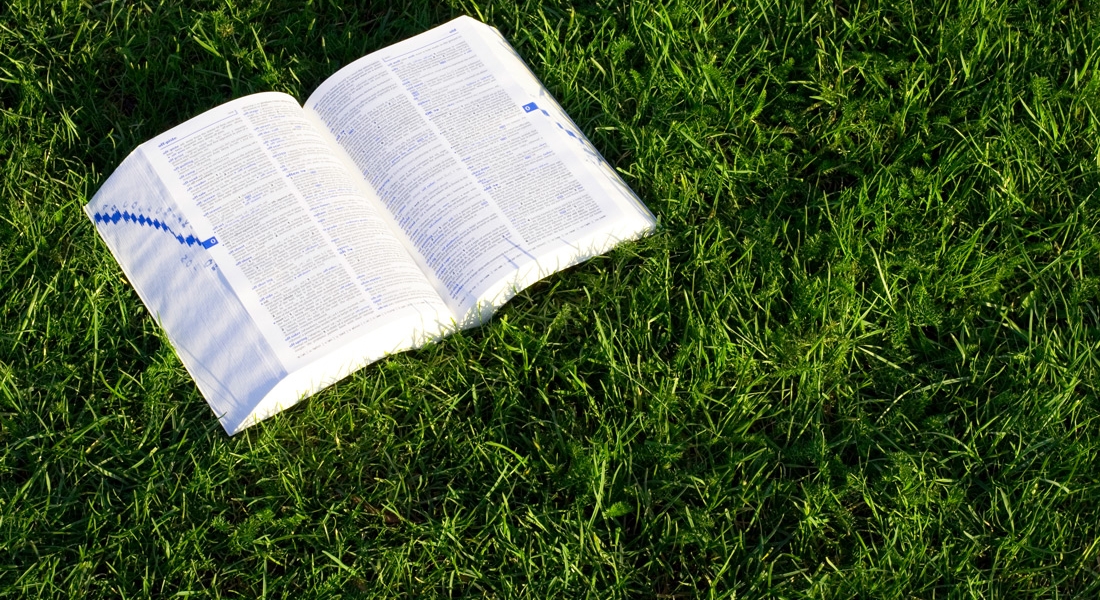Nature has always been the primary way God grabs my attention and shows me he exists. When the heavens declare the glory of God on a sparkling starry night, in the vibrancy of a technicolor sunset or in the whistle of crazy winds before a harsh storm, I hear them.
When my youngest son was five, we were standing in the ocean, and he said, "When I stand in here I feel like a small puzzle piece in God's big puzzle." He, too, has heard nature tell him about God—and Paul says that he's right (Romans 1:20).
This is one reason I have such a desire to take care of creation. I don't want to hinder anyone's ability to see or hear God because I've looked the other way at waste or pollution.
If you've noticed an added focus on environmentalism recently, it's because April is Earth Month, with an extra emphasis on saving the earth on April 22—Earth Day.
Am I really supposed to save the earth?
When God created the earth, he was pleased with all he made. God told the first people that their descendants would be in control of the world. God put them in charge of the fish, the birds, and all wild animals (Genesis 1:27–31; Psalm 89:11). That did not mean exploiting creation, but using it, cultivating it, and guarding it (Genesis 2:15; Psalm 115:16). But when our race fell into sin, the earth was affected too—vulnerable to corruption and decay.
Thankfully, God does not expect us to save the earth. In fact, Jesus has already saved the earth, though now we experience this only in part. Paul promises that one day creation will be set free and share "the glorious freedom of the children of God" (Romans 8:20–21). We look forward to a new heaven and new earth, when God's home will be among people (Revelation 21:1–3).
Scripture also tells us creation will be restored (Acts 3:21)—and even our bodies will be redeemed (Romans 8:23). Until then we continue to do our part. We don't save the earth, but God still calls each of us to care for his creation. Most times, when we care for creation, we also end up caring for people, cultivating resources that help others thrive.
Knowing this can relieve some of the pressure we sometimes feel, as if it is our personal responsibility to solve the world's environmental problems. We can shift our focus to those things we can reasonably do.
Three ways you can care for the earth
The three "Rs" of the environmental movement—reduce, reuse, recycle—are now heard so often that they are easy to ignore if not followed by specific actions. Here are three specific ways you can apply the biblical call to creation care—during Earth Month and all year long.
- Reduce food waste. About 40 percent of the food that Americans bring into their homes never gets eaten. The resources used in processing and transporting the food is wasted when food is thrown in the trash, and reducing waste also leaves more to share with the hungry. Get involved with your local food bank.
- Reuse electronics as long as you can. We long for the newest gadgets—faster, better or shinier than the still functional one we already have. But every disposal and purchase affects the environment. When you upgrade, sell or donate any usable devices and take broken ones to a responsible e-waste recycling center.
- Recycle your clothing. It's tempting to throw things into trashbags and haul them out to the curb when you're cleaning out your closets. By donating clothing instead of trashing it, you'll keep it out of landfills. The wearable clothing will often end up in the hands of someone who needs it, and clothing and other textiles that are no longer wearable frequently become rags, insulation and furniture stuffing.
Try implementing these practical steps to be a better steward of creation. Together we can help extend God's shalom—wholeness and peace—in the earth around us.
Follow more of Robin Shreeve's writing on the environment on Mother Nature Network
Want to learn about the Bible and caring for creation?
Read more posts about: Creation, Christian Living
Thanks to the support of our faithful financial partners, American Bible Society has been engaging people with the life-changing message of God’s Word for more than 200 years.
Help us share God's Word where
needed most.
Sign up to receive Bible-reading tips, tools and resources.


